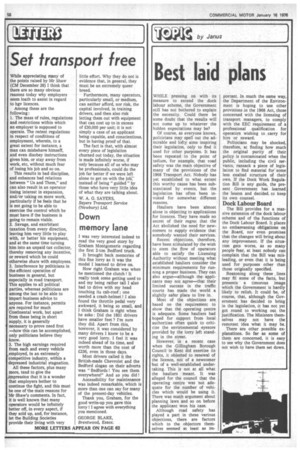Best laid plans
Page 60

If you've noticed an error in this article please click here to report it so we can fix it.
WHILE pressing on with its measure to extend the dock labour scheme, the Government still has not bothered to explain the necessity. Could there be some doubt that the results will not come up to whatever the hidden expectations may be?
Of course, as everyone knows, politicians may spell out the admirable and lofty aims inspiring their legislation, only to find it used for other purposes. It has been repeated to the point of tedium, for example, that road safety was the main objective of many of the provisions of the 1968 Transport Act. Nobody has yet established to what extent this worthy cause has been substantiated by events, but the legislation has often been invoked for somewhat different reasons.
Hauliers have been almost alone in objecting to applications for licences. They have made no secret of their regret that the Act abolished the need for newcomers to supply evidence that somebody wanted their services.
Recent objections, therefore, have been stimulated by the wish to stem the flow of operators able to satisfy the Licensing Authority without meeting what established hauliers consider the minimum requirements for running a proper business. They can also argue—although the applicants may not agree—that their limited success in the traffic courts has made the world a slightly safer place to live in.
Most of the objections are based on the requirement to show that the operating centre is adequate. Some hauliers had hoped for support from local authorities often quick to criticise the environmental eyesore provided by the lorry left standing in the street.
However, in a recent case when the Gillingham Borough Council in Kent did exercise its rights, it objected to renewal of the licence, not of a newcomer but of a well-established undertaking. This is not at all what the hauliers meant. It was alleged for the council that the operating centre was not adequate for the number of vehicles which would be using it. There was much argument about planning laws and so on before the applicant won his case.
Although road safety has played a part in these various objections, there are factors which to the objectors themselves seemed at least as im portant. In much the same way, the Department of the Environment is hoping to use other provisions in the 1968 Act, those concerned with the licensing of transport managers, to comply with the EEC requirement of a professional qualification for operators wishing to carry for hire or reward.
Politicians may be shocked, therefore, at finding how much the original purity of their policy is contaminated when the public, including the civil servants, ransack a piece of legislation to find material for some less exalted structure of their own. If the Dock Work Regulation Bill is any guide, the present Government has learned the lesson and decided to keep its own counsel.
Dock Labour Board
The Bill provides for a massive extension of the dock labour scheme and of the functions of the Dock Labour Board. It places no embarrassing obligations on the Board, nor even promises that the changes will bring about any improvement. If the situation gets worse, as so many people fear, at least nobody can complain that the Bill was misleading, or even that it is being used for purposes other than those originally specified.
Reasoning along these lines may fit some of the facts, but presents a timorous image which the Government is hardly likely to relish. It could 'be, of course, that, although the Government has decided to bring in the legislation, it has not yet got round to working out the justification. The Ministers themselves may not have the remotest idea what it may be.
There are other possible explanations. So far as some of them are concerned, it is easy to see why the Government does not wish to have them set down.












































































































